
A vendor waits for customers to buy handmade sweets at a street market ahead of Mawlid al-Nabi - REUTERS/Amr Abdallah Dalsh
CAIRO – 8 October 2021: These days every year, the Islamic nation, celebrate the birth of Prophet Mohammed.
The occasion is mainly celebrated through religious rituals, such as reading the Qur’an and sayings of the Prophet. However, since the time of the Fatimid Caliphate in the 10th century, the celebrations became more extravagant, as people started going out to celebrate through singing songs and religious anthems, telling stories about the Prophet (PBUH) and of course eating “Halawet al-Moulid” (sweet candy).
Halawet el-Moulid is different types of traditional pastries Egyptians make to commemorate the occasion. Pastries shops usually display different kinds of Halawet el-Moulid ahead of the occasion.
The famous sweets are made of sugar coated sesame, pistachio, and almond nuts. The Moulid doll and the sultan on a horse are made of sugar and nuts decorated with colored paper.
How Moulid pastries are made
While the most famous type of Halawat al-Moulid used to be “Al Arosa” (the bride) and “Al Hosan” (the horse), which were made of molten sugar, they are not as popular anymore. People now resort to more conventional types of Mawlid candy, such as “Foolia” (caramelized peanuts) and “Semsemia” (caramelized sesame treat) and other types of caramelized nut bars and coconut sweets.

Halawet el-Moulid is manufactured automatically and inside factories for many years. The manufacturing stage begins with heating sugar, then the stage of boiling at a certain temperature inside a large pot in order to manufacture large quantities and then put peanuts or sesame on it.

Then it is cut, flattened and divided into small pieces, then comes the packaging stage. The manufacturing process does not take long, where workers produce large quantities of the fresh candies in 30 minutes only.


In Egypt and most of the world, people celebrate el-Moulid on the 12th day of the third month of the Islamic calendar, Rabi’ al-Awwal, because the lunar calendar advances 11 days each year, meaning that the exact date changes from year to year.
In Egypt, the celebrations are rooted deep in the country’s history; the traditions which we know today were first introduced during the Fatimid era. Before then, celebrations involved reading Quran only. Since the Fatimid rule, public squares have been decorated, tents have been set up for Sufi singing and special Moulid sweets have been made.
Comments
Leave a Comment